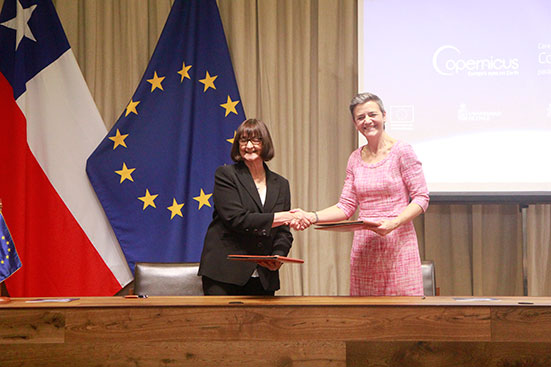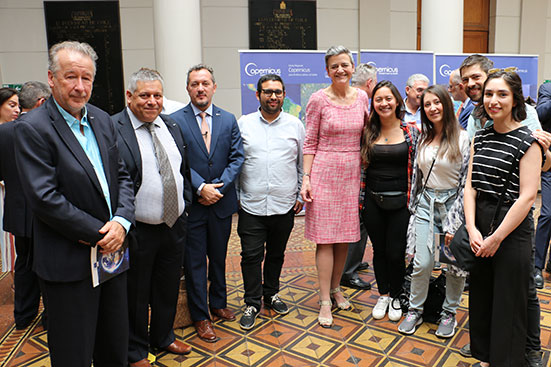
The initiative developed by the University of Chile, through the Center for Mathematical Modeling of the FCFM, seeks to strengthen the Copernicus data repository to extend its services to all of Latin America and the Caribbean, while providing regional services for monitoring land cover and land use, large cities and coasts throughout the region.
The Executive Vice President of the European Commission, Margrethe Vestager, together with the Rector of the University of Chile, Rosa Devés, presented this Saturday, March 11, the Copernicus Regional Center for Latin America and the Caribbean, CRC-LAC Chile.
The Copernicus Regional Center, developed by the Center for Mathematical Modeling (CMM) of the Faculty of Physical and Mathematical Sciences of the University of Chile, is part of the new EU-Latin America Digital Alliance, which seeks to promote a human-centered approach to digital transformation and will be launched in Bogota, Colombia, on March 14 by Executive Vice President Vestager.
The objective of the CRC-LAC Chile project is to establish a robust Copernicus data storage, processing and distribution center for the LAC region. This includes the coordination of in situ data from countries in the region and the processing of Earth Observation data for the development of localized regional services.

Launching ceremony of the Copernicus Regional Center at Casa Central of the U. de Chile. Photo credits: Comunicaciones U. de Chile.
In this regard, the executive vice-president of the European Commission, Margrethe Vestager, stated that “we believe that the strengthening of the center will have a very relevant impact on Chile and the region. The data provided by Copernicus, the world’s largest Earth observation program, can be used for concrete applications that can have great commercial and social value. For example, for real-time management of coastal, mining and agricultural resources, as well as for preventing or managing risks associated with climate change and natural disasters, as was recently the case in fire management. This is a clear example of how our digital partnership can contribute to addressing the challenges shared between the European Union and Chile.”

Photo credits: Comunicaciones U. de Chile.
For her part, the Rector of the University of Chile, Rosa Devés, celebrated that “this scientific collaboration agreement between the University of Chile and the European Union is very good news for the country, but also for Latin America and the Caribbean, since its results will benefit our entire continent”.
“We will put our capabilities at the service of satellite observation to produce rigorous evidence in the study of such relevant and pressing phenomena as climate change. This knowledge will be very important for public decisions and will contribute decisively to the objectives of sustainability that should inspire us in our university work. In addition, the agreement shows the fundamental role of cooperation and interdependence in the development of frontier research,” she added.

Florencio Utreras, Héctor Ramírez, rector Rosa Devés, Jaime Ortega and dean Francisco Martínez. Photo credits: Comunicaciones CMM.
For the Dean of the FCFM, Francisco Martínez, the Copernicus Regional Center will allow “timely access to spatial data in reduced time, becoming a great step for the development of the nations of Latin America and the Caribbean, allowing them to take actions for the prevention and reaction to natural disasters. As a Faculty, through our Center for Mathematical Modeling, we celebrate this significant collaboration that we are launching today with the EU”.
Benefits
The CRC-LAC Chile, which is funded with four million euros from the European Union, will take advantage of the enhanced connectivity available between Europe and the LAC region via the BELLA Cable, which enables fast and cost-effective data exchange between the two regions. It will be based on the existing Copernicus Hub in Chile, and will provide services for Latin America and the Caribbean by working in synergy with the Copernicus regional center in Panama, prioritizing the development of three generic services: land cover and land use monitoring, monitoring of large urban areas, and ocean coast monitoring.

Copernicus CRC-LAC Chile team with Ms. Margrethe Vestager and Dean Francisco Martinez. Photo credits: Comunicaciones CMM.
For Jaime Ortega, FCFM academic, CMM researcher and coordinator of Copernicus applications, in addition to expanding the repository, the essence of the project, based on free access and use of satellite images, will be maintained. Florencio Utreras, general director of the project, explained the scope of the initiative for the next four years: “The project extends the services of the Copernicus repository that is housed at the Center for Mathematical Modeling, so that the monitoring of oceans, city growth and land cover and use will now be extended to all of Latin America and the Caribbean”.
Visit to FCFM-CMM
During the morning of Saturday, March 11, the EU delegation headed by the Executive Vice President of the European Commission, Margrethe Vestager, visited the premises of the Center for Mathematical Modeling of the FCFM-U. de Chile. On the occasion, the authorities of the FCFM, headed by the Dean Francisco Martinez, held a meeting with the participation of members of the CMM, the Space Program of the U. of Chile, EU ambassadors, among other authorities.

Photo credits: Fundación Encuentros del Futuro
On the occasion, the work developed by our Faculty in the field of Earth observation was presented. Later, they visited the National Laboratory for High Performance Computing (NLHPC) that houses Guacolda-Leftraru, the most powerful supercomputer in Chile and one of the most powerful in South America, which will provide services to the Copernicus Regional Center.
EU delegation:
- Margherete Vestager, Executive Vice-President of the European Commission for a Europe Fit for the Digital Age and European Commissioner for Competition.
- León de la Torre Krais, EU Ambassador to Chile.
- Henrik Bramsen Hahn, Danish Ambassador to Chile.
- Ewout Sandker, Head of Cooperation Section, EU Delegation in Chile.
- Pía Hevia, Cooperation Officer.
- Quentin Weiler, head of the Political, press and information section.
FCFM delegation:
- Francisco Martínez, Dean of FCFM.
- Marcela Munizaga, vice dean.
- Luis Vargas, Director of External Liaison, Dirvex.
- Héctor Ramírez, director of the CMM.
- Florencio Utreras, director of Copernicus project.
- Jaime Ortega, Copernicus applications coordinator.
- Marcos Díaz, FCFM- UChile Space Program.
- Jaime San Martín, scientific director of NLHPC.
- Alejandro Maass, Director of International Relations, CMM.
- Salomé Martínez, Director of Transfer and Innovation, CMM.
Source: UE – Uchile – FCFM – CMM
Posted on Mar 13, 2023 in News




 Noticias en español
Noticias en español
